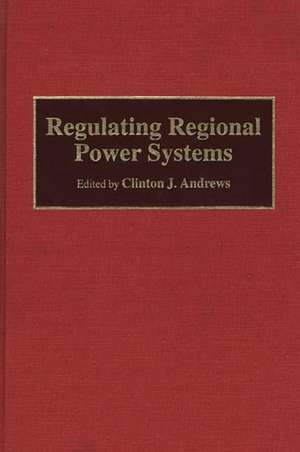Regulating Regional Power Systems
Autor Clinton J. Andrewsen Limba Engleză Hardback – 23 ian 1995 – vârsta până la 17 ani
Preț: 442.21 lei
Preț vechi: 710.26 lei
-38% Nou
Puncte Express: 663
Preț estimativ în valută:
84.63€ • 91.89$ • 71.09£
84.63€ • 91.89$ • 71.09£
Carte tipărită la comandă
Livrare economică 23 aprilie-07 mai
Preluare comenzi: 021 569.72.76
Specificații
ISBN-13: 9780899309439
ISBN-10: 0899309437
Pagini: 416
Dimensiuni: 156 x 235 x 24 mm
Greutate: 0.76 kg
Ediția:New.
Editura: Bloomsbury Publishing
Colecția Praeger
Locul publicării:New York, United States
ISBN-10: 0899309437
Pagini: 416
Dimensiuni: 156 x 235 x 24 mm
Greutate: 0.76 kg
Ediția:New.
Editura: Bloomsbury Publishing
Colecția Praeger
Locul publicării:New York, United States
Notă biografică
CLINTON J. ANDREWS teaches at Rutgers University. Previously, he was at the Woodrow Wilson School of International Affairs at Princeton University, where he helped launch a program in Science, Technology, and Public Policy. He has developed an expertise in policy analysis from the bottom-up perspectives of engineering and planning. His non-academic background includes engineering project management in the private sector and technology assessments for government. His recent academic work focuses on the modeling and analysis of regional electric power systems and other problems involving multi-party decision making and regulatory policy. Professor Andrews was educated at Brown University and MIT.
Cuprins
List of FiguresPreface and AcknowledgmentsIntroduction: Electricity Meets Federalism by Clinton J. AndrewsTopical PerspectivesThe Debate Over Change: Increasing Competition in the Electric Power Industry by Charles G. StalonReal planning, Sham Competition, and State Regulation by David R. Wooley and Alfred CavalloChange in a Federal System: Thinking Politically About American Federalism by Michael N. DanielsonA Basis for Allocating Regulatory Responsibilities by Kenneth Gordon and Christopher Mackie-LewisOptions for Regulatory Reform: Planning versus Competition and Incentives: Conflicts, Complements, or Evolution by Kenneth RoseNetwork Oligopoly Regulation: An Approach to Electric Federalism by Richard P. O'Neill and Charles S. WhitmoreModes of Cooperation: Inter-jurisdictional Economic Cooperation: Regional Power Markets by Kevin A. KellyInter-jurisdictional Environmental Cooperation: Regional Emissions Trading by Praveen K. Amar, Michael J. Bradley, and Donna M. BoysenInter-firm Cooperation: Maintaining Reliability of Electricity Supply by Michehl R. GentThe Analytical Basis for Decisions: Bottom-up Analysis for Utility Decisions: Company, State, and Regional Models by Benjamin F. HobbsTop-Down: The National Energy Modeling System by Mary J. HutzlerCase Studies and Analysis of Regional SystemsNorthwest Power Planning Council: Case by Richard H. Watson, Comment by Kenneth CostelloNew England: Case by Stephen R. Connors, Comment by Barry SolomonAmerican Electric Power Company: Case by Raymond M. Maliszewski, Comment by Jerry WissmanNew York: Case by William J. Balet and Charles R. Guinn, Comment by Richard SchulerPacific Gas & Electric Company: Case by Jackie Pfannenstiel, Steven Kline, and Kathy Treleven, Comment by Lyna WigginsTennessee Valley Authority: Case by Mary Sharpe Hayes, Comment by Allan PulsipherEuropean Community: Case by Francis McGowan, Comment by Richard D. TaborsRegional Diversity: Circumstance or Choice? by Clinton J. AndrewsBibliographyIndex



















